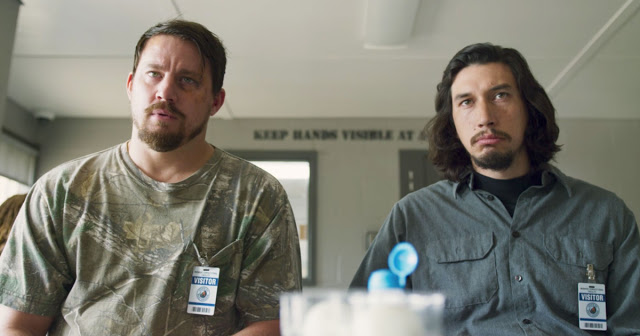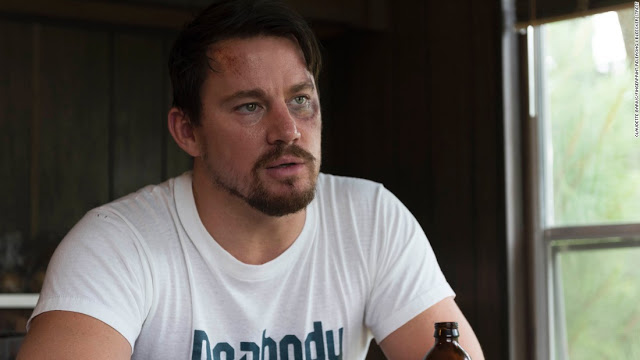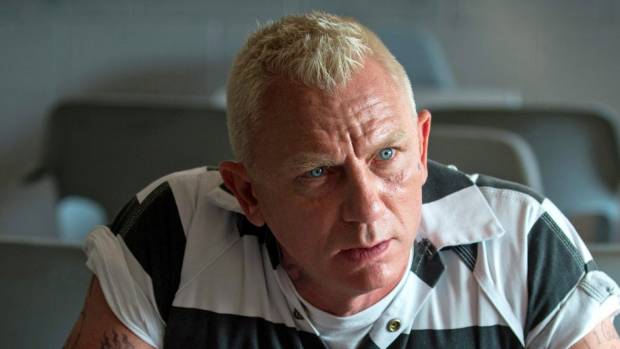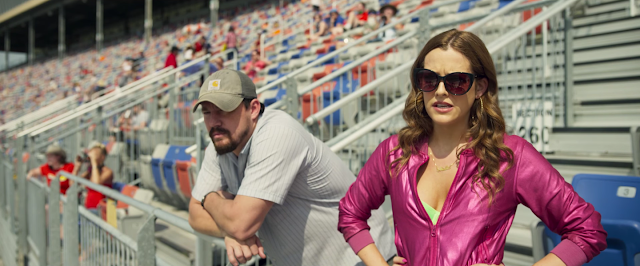Steven Soderbergh’s Logan Lucky opens with Jimmy Logan (Channing Tatum) regaling his 10-year-old daughter, Sadie (Farrah Mackenzie), about the creation of “Take Me Home, Country Roads”. It’s a colorful tale, complete with serendipitous car crashes and an all-night jam session, and Sadie asks her father if he perhaps admires the classic ballad because of the story behind its genesis. Jimmy responds that, while he appreciates the ditty’s backstory, that isn’t what makes it special. “I like the song because of the song,” he says.
It’s a sweet, disarming scene, quickly establishing the film’s gentle and laid-back vibe, but for cinephiles, it takes on a meta context. Those of us who mourned Soderbergh’s announcement in 2013—that, after releasing two movies that year (the slightly overrated Behind the Candelabra and the decidedly underrated Side Effects), he was retiring from filmmaking—could be forgiven for cherishing Logan Lucky simply because it heralds the return of one of American cinema’s most gifted and versatile directors. But while I’m delighted to have Soderbergh back in theaters (during his so-called retirement, he made two seasons of The Knick for Cinemax), my appreciation of Logan Lucky doesn’t stem primarily from him ending his self-imposed hiatus. To paraphrase Jimmy: I like the movie because of the movie.
Likability has not always been Soderbergh’s primary concern. A number of his 21st-century efforts—in particular Che, Full Frontal, and The Girlfriend Experience—have felt less like movies than formal experiments, their maker restlessly tinkering with his style and exploring new modes of storytelling, camerawork, and even distribution. But when Soderbergh stops messing around, his films can be bracingly good, so effortlessly entertaining that they mask their technical rigor. And Logan Lucky is perhaps his most relaxed picture since the Ocean’s Eleven trilogy. Soderbergh has made an irritating habit of criticizing the American movie business, but there’s no judgment on display here, only joy.
Some of this is a matter of genre. The heist film is durable in part because it yields characters who are both outlaw and hero, avowed criminals whom we nevertheless root for to break the law and beat the system. And as outlaw heroes go, Jimmy is more sympathetic than most. Played by Tatum with a West Virginia drawl and a journeyman’s limp, he’s a former football star who now works construction. After being laid off from his gig at the Charlotte Motor Speedway—his foreman apologetically mumbles something about liability issues and preexisting conditions—Jimmy decides to help himself to some severance in the form of a robbery. There’s a whiff of subtext surrounding this blue-collar laborer’s resort to crime—think Hell or High Water, Appalachia Edition—but Logan Lucky isn’t interested in harshing its mellow with a political agenda. It just wants to watch Jimmy assemble a crew and rob a racetrack.
That sense of agreeable admiration transfers to the audience, which can enjoy the film’s hijinks and also the contributions of its own talented crew. Pulling off a heist, Logan Lucky suggests, is similar to making a movie: The mastermind hatches the scheme and delegates the roles, then trusts the players to do their part. Here, Soderbergh has compiled a characteristically high-caliber cast, including Adam Driver as Jimmy’s brother Clyde, a bartending veteran with a prosthetic forearm and a greasy haircut, and Riley Keough (who lit up the small screen in the televised adaptation of The Girlfriend Experience) as their sister Mellie, a hairdresser with a no-nonsense attitude and more brains than she lets on. Smaller parts are also filled by familiar faces; a breezy Katherine Waterston swings by as a potential love interest for Jimmy, while an awkward Hilary Swank plays the FBI agent investigating the robbery’s chaotic aftermath. These are all dedicated professionals who, like their director, work hard to make their craft look easy. They also appear to be having a grand time, no one more so than Daniel Craig, who seems positively delighted to be temporarily unshackled from the burdensome role of 007, and who brings hammy charm and withering sarcasm to his part, an incarcerated explosives expert by the name of Joe Bang.
As that magnificent moniker makes clear, Logan Lucky never risks taking itself too seriously. But while it is consistently funny and occasionally verges on farce, and while the characters never seem threatened by true danger, the movie is not entirely devoid of stakes or emotion. Instead, the warm tone feels like a conscious storytelling choice, an intimation that collaboration pays off and that decent people deserve happiness. This may explain why, with the exception of an ill-conceived promoter (Seth MacFarlane, unrecognizable behind a bushy moustache and a Cockney accent), there aren’t really any villains on screen; sure, Jimmy’s ex-wife, Bobbie Jo (Katie Holmes), can be a bit snippy, but she clearly loves her daughter, and her new husband, Moody (David Denman), is a friendly fellow who thinks that Jimmy is a good guy. A late scene, in which Sadie performs at a pageant, is surprising in its poignancy, one of the most moving moments in Soderbergh’s entire filmography.
Some may compare that sequence to the fountain scene in Ocean’s Eleven, and overall, Logan Lucky resembles its Vegas-set predecessor so thoroughly that the script, by “Rebecca Blunt”, openly acknowledges the two movies’ similarities. (A newscaster describes the Logans’ robbery as being perpetrated by the “Ocean’s 7-11 Gang”, based on the centrality of a convenience store.) Yet oddly, where Logan Lucky falters is in its lack of crime-caper snap. Soderbergh’s compositions remain fluid, combining steady long takes with precise framing, but on a fundamental level, he never properly communicates the heist’s mechanics. There are a number of distinctive grace notes—two convicts latching onto the underbelly of a delivery truck, a cake filled with cockroaches, a hilarious mishap with a vacuum—but unlike the Ocean’s films, they don’t weave into a coherent tapestry. This makes the film’s ultimate reveal, one of those rapid-fire reconstructive flashbacks that Soderbergh made fashionable in Ocean’s Eleven, worthy less of a cheer than a shrug.
Yet while Logan Lucky is missing the frisson of excitement that attends the best crime pictures—the vicarious thrill of watching brilliant thieves execute an ingenious plan—that flaw is hardly ruinous, and it’s arguably even in keeping with the film’s laissez-faire attitude. This is a movie that takes potentially combustible situations and twists them into sly comedy, such as when two state troopers (played by Nascar drivers Carl Edwards and Kyle Busch) are too preoccupied with a helpless old lady to notice a sports car zooming past them, or when a wild prison riot serves as mere setup for an uproarious joke about Game of Thrones. The opacity of the heist may have you furrowing your brow, but the good vibrations will keep you smiling throughout.
In his review of Ocean’s Eleven, Roger Ebert gave it mild praise but dismissed it as a lark, concluding, “Now it’s time for Soderbergh to get back to work.” Logan Lucky improbably satisfies both sides of this equation; it’s a jovial caper that also represents the resumption of its maker’s career, and its playfulness feels meaningful rather than trifling. Early in the film, Clyde mutters something to Jimmy about a family curse, but Jimmy rejects such superstition as ridiculous. He’s right. As this fleet, enchanting movie unfolds, it becomes clear that the Logans are actually quite lucky. With Soderbergh at the helm, so are we.
Jeremy Beck is the editor-in-chief of MovieManifesto. He watches more movies and television than he probably should.





This was not worth spending money on at the theatre. Outside of the hand scene, meh. I think you give it too much credit.
In terms of it not being worth the money: As the hilarious tag in the closing credits provided, "Nobody was robbed in the making of this movie. Except you."